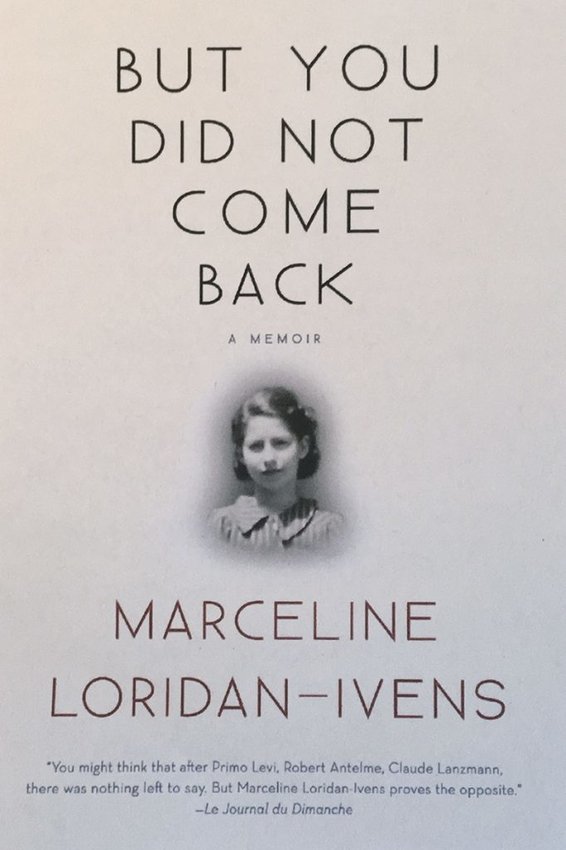 Book Review: "But You Did Not Come Back: A Memoir”
Book Review: "But You Did Not Come Back: A Memoir”
“But You Did Not Come Back: A Memoir”
By Marceline Loridan-Ivens
Atlantic Monthly Press, 2016
Marceline Rozenberg, a Polish Jew, was 15 and living in her father’s adopted country of France when World War II began.
The family understood they needed to get away, but stayed “one day too long,” when the Vichy government’s militia began rounding up Jews and shipping them to Germany. Her mother, two sisters and two brothers escaped capture. Father and eldest daughter, Marceline, hid in the garden but were discovered, arrested and shipped out in a cattle car to an internment camp at Drancy.
Before they were separated at the camp, her father told Marceline, “You might come back, because you’re young, but I will not come back.”
The men were sent to Auschwitz and women and children to Birkenau, two different worlds only 3 kilometers apart.
They saw each other once, when both were in their lines heading to work. Her father came to her and embraced her, but a guard called her a whore and beat her until she passed out. She awoke to find a tomato and onion in her hand, final gifts from her father.
This book is Loridan-Ivens’ letter to her father, written as an 86-year-old woman. In simple language, without frills or excessive descriptions, she brings the atrocities of the Holocaust to light as lived by a teenage girl.
She recalls some special memories of times together before the war, but basically it is the story of the horror of those years in the death camp. This was where children, the elderly and the ill went to the gas chambers. The women stripped to be inspected by male officers who decided who would stay to work and who would be put to death immediately.
Loridan-Ivens was petite but worked hard and struggled to survive, dreaming of seeing her father again when the war was over.
One of her chores was to clean the men’s toilet and hallways while they were off working. She sang loudly and cheerfully while doing it in case her father was near enough to hear.
When the women and girls here were made to march in snow and cold and arrived at another camp with no gas chambers, she rolled bare in the snow to kill the fleas and sang in her tent with hope for the future.
Loridan-Ivens returned home after two years; her father did not. The family wanted her father back rather than her and made no secret about it. They could not comprehend her experiences and did not want to hear about them. She was told to get over her negative feelings and recollections. She found herself wanting to die instead of live. She said this treatment was common among the survivors she met then and later.
Loridan-Ivens later became an actress, screenwriter and director. She directed several documentaries with her late husband, Joris Ivens, and eventually made a film of her story, “The Birch-Tree Meadow.”
Now 87, Loridan-Ivens is one of 160 living survivors of the 2,500 French Jews who returned from the war out of the 76,500 who were sent to Auschwitz-Birkenau. As Europe becomes increasingly intolerant, she believes that the lessons of World War II are not being forgotten because “these lessons were never learned,” she said in an interview with The New York Times.
I found it hard to understand the reaction of those who had been safe at home in those years and wanted no information about what survivors had suffered. We are fortunate to have several of these memoirs about life in those camps to help us understand and to prevent anything like it from happening again.
UNDERWRITTEN BY THE FUND FOR NONPROFIT NEWS (NEWSMATCH) AT THE MIAMI FOUNDATION, THE ANGEL GUILD, ADVERTISERS, DONORS AND PEOPLE WHO SUPPORT INDEPENDENT, NONPROFIT LOCAL NEWS